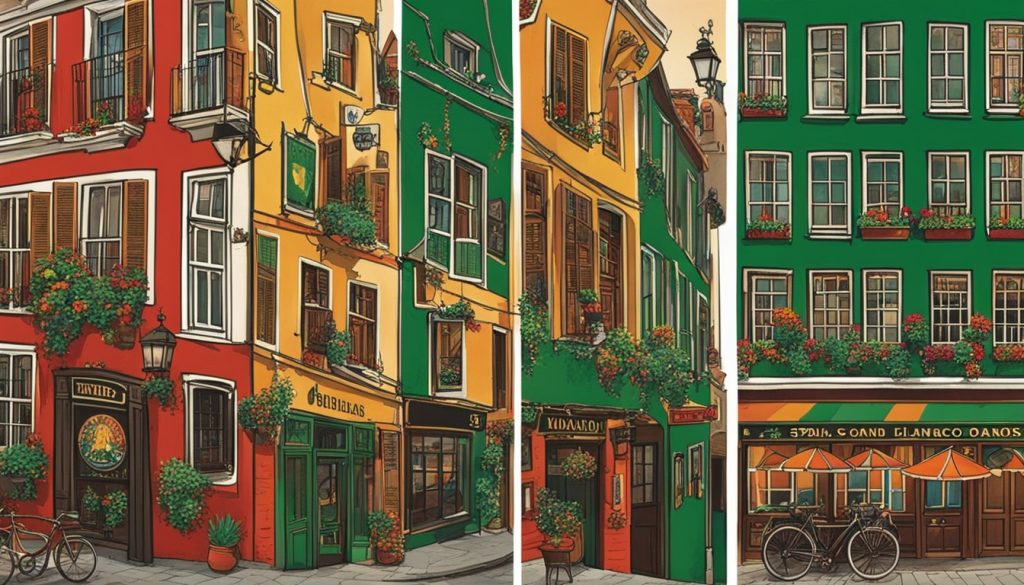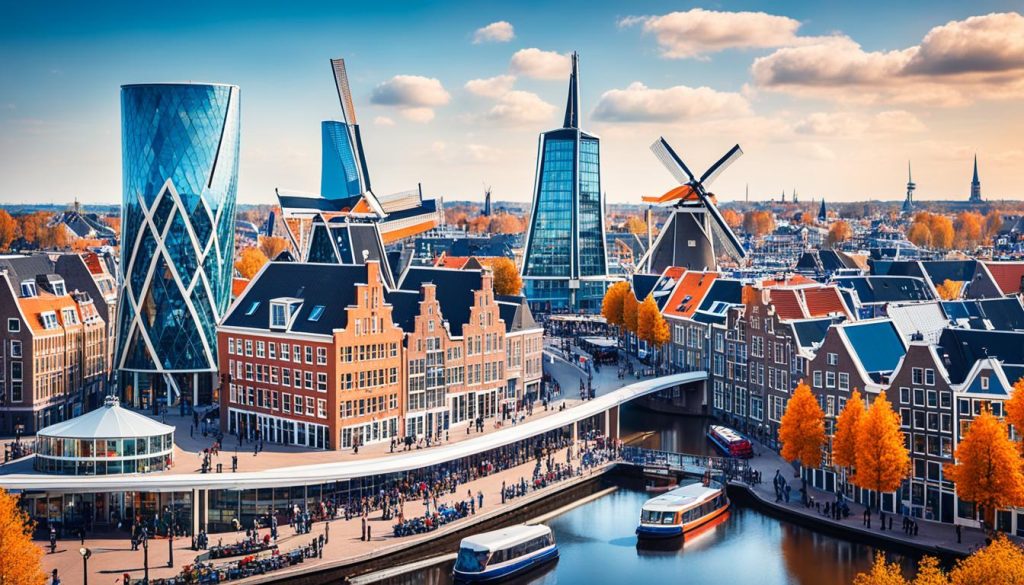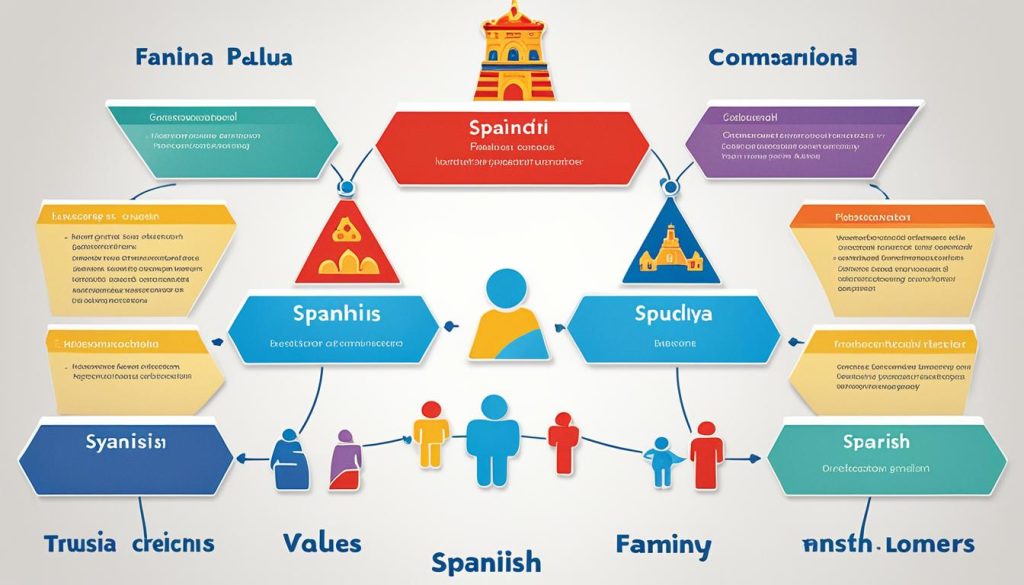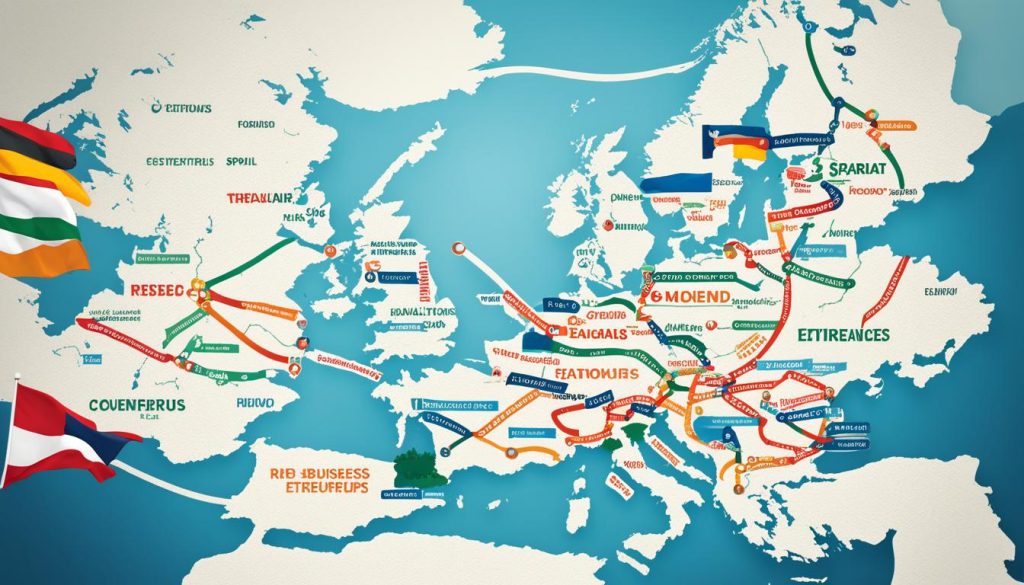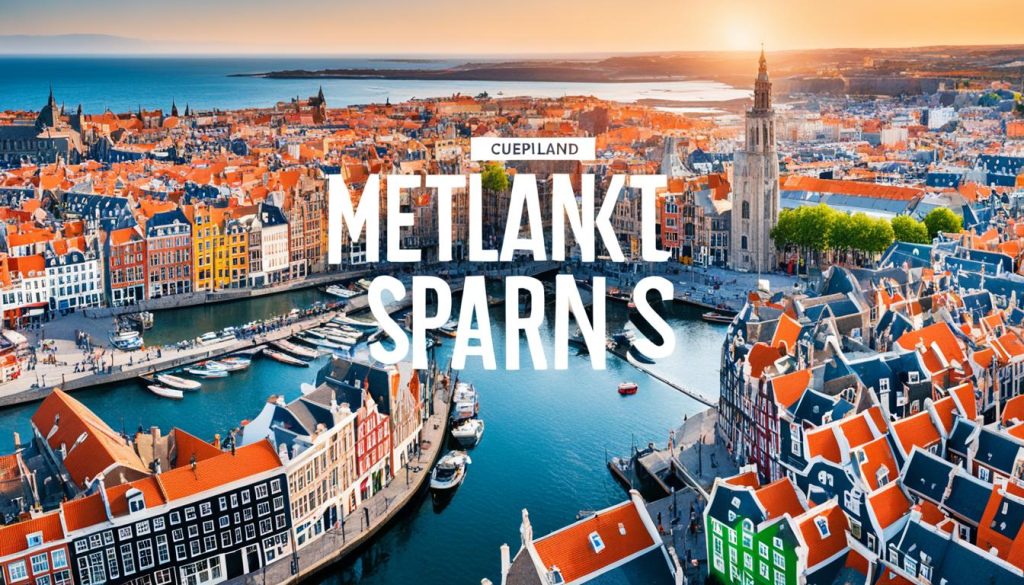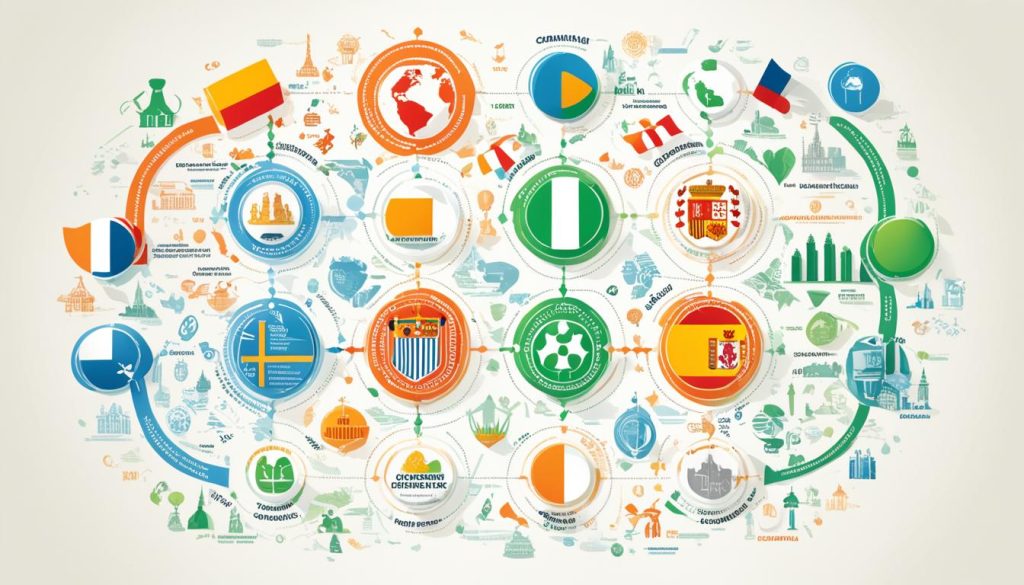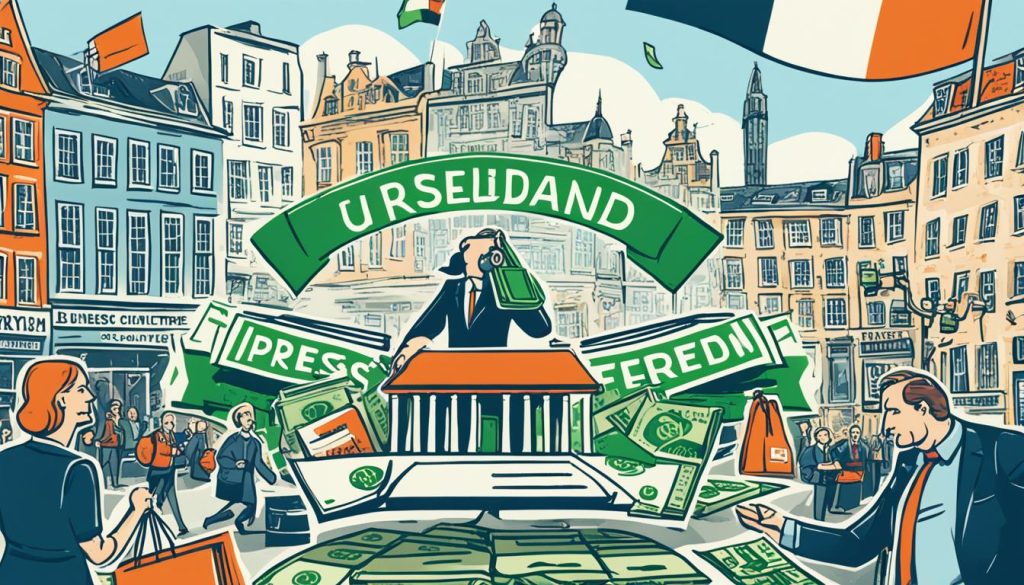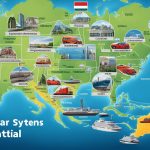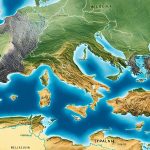In exploring European economies, the blend of business and culture catches the eye. Ireland charms with its Celtic roots, the Netherlands shines with forward-thinking, and Spain dazzles with its lively customs. Each has a commercial scene that’s distinct. What makes these nations stand out in business and culture?
The mix of rules for economic activities and social habits is crucial in these markets. In Ireland, the Netherlands, and Spain, it’s more than just laws and taxes. It’s also about the informal norms and values that play out in business meetings and events.
Understanding the Business Culture Complexity Index
The Business Culture Complexity Index (BCCI) helps international businesses understand global markets. It looks at business practices in different countries, showing both clear and hidden challenges. The index includes factors like economic freedom, business ease, and society’s corruption levels. This gives firms a full picture of each country’s business environment.
Denmark is known for its simple rules and high economic freedom, making its business culture the least complex according to the BCCI. On the other hand, Bangladesh has a more complex culture due to its hierarchy and community values. This requires more thoughtful strategies for effective engagement.
- Economic Freedom: It lets firms know how free markets are under government rules, guiding investment and expansion decisions.
- Corruption Perception: Knowing a country’s corruption level helps shape a company’s operations and strategies, with clearer countries being more stable.
- Ease of Doing Business: High scores mean less paperwork, making it easier to start and run businesses.
Countries like Ireland, the Netherlands, and Spain show the BCCI in action. They’re all in Europe but have different cultures and corruption levels, affecting businesses. Ireland and the Netherlands are known for simple business settings and freedom. Spain, however, requires understanding cultural subtleties and navigating business ease.
- Ireland’s forward-looking policies make it appealing for worldwide companies, backed by a commitment to economic freedom.
- The Netherlands is praised for its fair business culture and anti-corruption measures, promoting open dealings.
- Spain’s business scene is influenced by its traditions, affecting its corruption view and how businesses operate.
The BCCI guides firms through cultural differences and market entry strategies worldwide. It clearly outlines economic freedom, ease of doing business, and corruption perception. This helps manage and conduct business across various countries.
Analyzing Ireland’s Position in the Business Culture League Table
Ireland sits at the edge of Europe, blending old and new business cultures. It combines history and modernity in its corporate world, valuing education and work-life harmony.
Historical Influences on Ireland’s Business Practices
Ireland’s green lands are rich with history that shapes its business today. Its past struggles and independence have fostered resilience. Irish businesses are known for being friendly and cooperative, thanks to this history.
Modern Business Etiquette and Education in Ireland
Irish business now focuses on professionalism and etiquette. It prides itself on high-quality education, preparing a skilled workforce. This education ensures employees are creative and aligned with international norms.
Work-Life Balance and Social Integration in Irish Culture
The Irish work hard but value work-life balance deeply. This balance is key in their culture, enhancing happiness and job satisfaction. Their approach to business includes a strong sense of community, boosting innovation and a positive workplace.
Ireland shines in the global business scene for its heritage, education, and life quality. It excels, showing the world how to blend tradition with progress.
Demystifying the Netherlands’ Business Environment
In understanding the Netherlands economic landscape, knowing Dutch business customs is key. These customs drive a successful entrepreneurial scene and ensure transparent communication. The Dutch value equality and involve everyone in decisions, making everyone feel responsible.
The Netherlands’ business success stems from its open market. This openness comes from policies that welcome all business sizes. There are three key policies:
- Fair and Equal Treatment – Everyone gets the same market chances, big or small.
- Innovation Support – They foster creativity and progress, using skilled people.
- International Orientation – Its prime location aids in a global business view.
The Dutch value transparent communication highly, even in international deals. This transparency builds trust and confidence worldwide.
- Clear and Direct Dialogue – They’re straightforward, which shows honesty.
- Access to Information – Clear rules mean everyone understands what’s expected.
- Trust and Happiness – High trust and happiness scores show a positive business atmosphere.
The practices and philosophies in the Netherlands economic landscape show how it attracts innovation and trade. Dutch business customs mix respect for people and businesses, promising success through fairness, progress, and sincerity.
Cultural Values and Economic Outlook in Spanish Business
The Spanish business world is shaped by its rich history. This is seen in its Spanish business hierarchy, traditional values, family influence, and distinct commercial practices in Spain. These elements are key to understanding business operations in Spain’s lively economy.
Spain’s Approach to Hierarchies and Business Negotiations
In Spain, the business ladder mirrors the society’s broader structure. It’s filled with levels of respect and power. Yet, there’s also a friendly atmosphere and a push for agreement. This is crucial for successful talks and lasting partnerships. Understanding these layers, with a deep respect for Spanish culture, is necessary.
The Role of Family and Tradition in Spain’s Commercial Activities
Family businesses are crucial to Spain’s economy, bringing strength and a sense of ongoing legacy. The role of family in business creates a loyal and personalised way of working. This ties well with deep-set traditions. In Spain, this family bond goes beyond just kinship. It includes workers, clients, and partners, showing how vital families are in business circles.
- Valuing family legacies in business
- Keeping to collaborative business methods
- Mixing business with personal ties
It’s vital for anyone looking to thrive in Spain’s business scene to understand these cultural nuances. Honoring traditions, valuing the hierarchical structure, and recognizing the power of family ties shape Spain’s business practices. This creates a rich field of opportunities for savvy business people.
Compare Business and culture between Ireland, Netherlands and Spain
Looking at cultural impact on business, we see Ireland, the Netherlands, and Spain have unique traditions. These customs shape their ways of doing business. Comparing how easy it is to do business can show us different methods they use.
Ease of Doing Business: A Comparative Look
The Netherlands business scene ranks high for ease of doing business. It shows few obstacles for new businesses to grow. Ireland and Spain also offer good opportunities but with their specific challenges and advantages. They have different degrees of economic freedom and rules.
Impact of Communal Values on Business Practices
Communal values are key in looking at business dealings in these countries. In Ireland, building strong relationships and trust is vital for business. In Spain, there’s a strong sense of tradition and respect for hierarchy and family. The Netherlands values being direct and equal in business talks. This mirrors their national values of openness and fairness.
- Ireland: Investment in relationships and trust-based business ethos.
- Netherlands: Egalitarian and transparent business interactions.
- Spain: Emphasis on traditional hierarchy and familial bonds within business.
Understanding these elements helps us see the big picture of cultural impact on business. It lets us value the unique business cultures in each country.
Trust and Transparency Profiles in Irish, Dutch, and Spanish Markets
Understanding trust levels in Ireland, the Netherlands, and Spain helps grasp their market dynamics. This includes appreciation for market transparency. Both are key to perceived business integrity by those investing or interested. Let’s explore how these crucial factors vary among these countries.
- In Ireland, trust grows from strong regulation and clear business practices. Ireland is known for fairness and a vibrant competitive environment. This builds confidence among consumers, investors, and businesses alike.
- The Netherlands is celebrated for its market transparency. Its open trade policies and straightforward regulations make it a model for European business integrity. The Dutch approach is admired for showcasing how transparency should be.
- In Spain, personal relationships play a big role in business trust. Though there have been reforms, Spain aims for better transparency and business integrity. These personal ties can both help and hinder trust levels.
Each country’s unique approach significantly influences international business. Their different levels of trust and transparency impact partnerships and negotiations. Therefore, global companies need to adjust their tactics to match the diverse business cultures.
Exploring Work Ethics and Business Communication Styles
In our global business world, it’s vital to grasp work ethics and business communication. As we look at Ireland, the Netherlands, and Spain, we see different cultural approaches to professionalism. These differences help smooth international operations.
Differences in Directness and Indirectness in Communication
In these countries, communication styles can be direct or indirect. The Irish use a nuanced approach, often sharing stories to persuade gently. In contrast, the Dutch are known for being straightforward. They believe in ‘bespreekbaarheid’ – discussing anything openly.
Impact of Work Ethics on Business Operations Across Cultures
Work ethics impact a company’s internal and external operations. Irish companies focus on teamwork and shared success. This reflects their community-oriented mindset. Meanwhile, in the Netherlands, a flat structure promotes equality and values everyone’s opinions.
In Spain, the emphasis is on personal relationships and loyalty. This creates enduring business partnerships. These differences in work ethics shape a business’s approach, from leadership to negotiations.
Expanding businesses across borders requires understanding these cultural nuances. Respecting the unique communication styles and work ethics of Ireland, the Netherlands, and Spain is crucial. It shows how culture deeply influences global business.
How Press Freedom Reflects on Ireland, Netherlands, and Spain’s Business Culture
Looking at press freedom can tell us a lot about business openness and morals in a country. Ireland shows a strong commitment to press freedom. This is key to an environment where businesses are open and honest. Such openness in the media matches with a business scene that prizes honesty and straightforward talks.
In contrast, the Netherlands scores high for press freedom and media transparency. This boosts its image as a leader in transparency and fairness. Companies in the Netherlands gain from this clear environment. It boosts confidence among stakeholders and makes it easier to understand business transparency.
Spain also values media openness, although it faces its own set of challenges. These issues reflect Spain’s varied political and cultural scene. Yet, Spain has a lively setting where press freedom is crucial. It helps keep business activities clear and promotes moral business practices.
- An analysis of Ireland’s press freedom shows it’s vital for honest business interactions.
- There’s a clear link between press freedom in the Netherlands and its clear business scene. This makes it more appealing to global investors.
- Despite its hurdles, Spain stands by media openness. This is critical for keeping businesses accountable.
To wrap up, the connection between press freedom and business life in Ireland, the Netherlands, and Spain is crucial. It highlights how essential a free press is for an open and honest business climate. The impact on global market truth, risk checks, and reliable information is huge. Each country’s pledge to media openness molds its business habits and how the world sees it.
Evaluating the Role of Religion in Business Across Ireland, Netherlands, and Spain
Across Europe, culture blends with religion to affect business. Looking at Ireland, the Netherlands, and Spain, it’s clear religion plays a role. The way each country does business shows how history and social context matter.
In Ireland, Catholic beliefs shape the business world. Business there is about community, trust, and respect. It reflects Ireland’s religious roots. Spain’s businesses also feel the impact of Catholicism. This brings a focus on tradition and family.
The Interplay between Religiosity and Commercial Transactions
The Netherlands takes a secular stance, putting religion aside in business. Communication is direct, and dealings are equal. This approach lessens religious impact and promotes fairness in trade.
- In Ireland, the interlacing of Catholic values within corporate circles often leads to a preference for relationships over aggressive negotiation.
- Spanish business culture respects the siesta and holiday observances, highlighting how religious traditions shape commercial operations.
- The Dutch dedication to transparency over ritual showcases an inclination towards a secularised, yet culturally sensitive, business framework.
The business approaches of these countries are shaped by their religious heritages. Understanding the religious influences is key for global businesses entering these markets. Knowing how religion shapes business can help in navigating the local commercial practices.
Assessing the Role of Education and Human Development in Business Acumen
Education and human development play a big role in economic success. This topic interests economists, policymakers, and business leaders. Education and skills shape business innovation and entrepreneurship. This is key in any modern economy. Looking at Ireland, the Netherlands, and Spain shows how education supports human development. This leads to changes in business.
Education Systems’ Influence on Business Innovation and Entrepreneurship
Education is vital in creating innovators and entrepreneurs. It prepares a skilled workforce, rich in knowledge. This workforce boosts the economy. Ireland focuses on higher education. This brings talent to innovative industries. The Netherlands blends practical skills with a global view. This prepares individuals for worldwide markets.
Spain’s education mixes history with new goals. This creates a workforce that understands global entrepreneurship trends. Each country’s education approach shows its power in shaping entrepreneurial skills.
Comparative Analysis of Workforce Skill Levels in Ireland, Netherlands, and Spain
- Ireland invests in education. This grows sectors like technology. The Irish workforce is adaptable and innovative, thanks to higher education.
- The Netherlands has a skilled workforce. It welcomes international businesses, thanks to hands-on learning and a focus on research.
- Spain is improving through vocational training and education reforms. This strengthens its workforce skills. It aims to boost innovation.
The importance of human development in business is clear globally. These countries show that strong education systems and skill development lead to economic growth. They encourage innovation and entrepreneurship.
The Impact of Internet Usage on Business Operations and Culture
The internet has dramatically changed how businesses operate, especially in Ireland, the Netherlands, and Spain. It has led to a new digital culture. Businesses in these countries have become more innovative and digital-friendly.
-
In Ireland, the wide use of the internet has sparked a change towards a tech-savvy economy. This change has made business operations more linked and streamlined. The success of Ireland’s tech scene shows how important high internet use is.
-
Looking at the Netherlands, it’s clear that high internet use has made Dutch businesses better at digital communication. This improvement has created a strong business network that can do well globally. This is especially true in e-commerce and international trade.
-
In Spain, the internet has played a big role in shaping a digital culture. Against the backdrop of Spain’s rich culture, businesses use online platforms to grow. They aim to stay competitive in the digital market.
The use of internet technologies in Ireland, the Netherlands, and Spain has made traditional practices simpler. It has improved the sharing of information, customer interaction, and remote work. This use of the internet has done more than just change operations; it has changed the culture of business. It shows the big effect of digital adoption.
-
The widespread use of the internet in these countries is creating a digital culture. This culture expects online services and digital customer support as standard.
-
Businesses are now relying more on digital platforms for marketing, sales, and communication. This shift has made businesses more flexible and quick to respond.
-
Thanks to the internet, Ireland, the Netherlands, and Spain are leading the way in digital business innovation. The higher internet usage is introducing new tech solutions.
The strong internet systems in these countries are opening doors for businesses to innovate and expand. Digitalisation is becoming a key part of their economies. As these countries continue to make the most of the internet, their business operations and digital cultures will keep evolving.
Corruption Perceptions and Its Influence on Business in Ireland, Netherlands, and Spain
Today, being transparent and ethical in business is quite important. People everywhere, including investors and those in the public, look closely at how businesses handle corruption. Countries like Ireland, the Netherlands, and Spain are often in focus. They work hard to keep corruption out of their businesses. This effort helps them do well in the global market.
The Correlation between Corruption Levels and Business Complexity
In places where unethical business is common, things can get very complicated. Companies there face lots of rules and may encounter corrupt practices. On the flip side, in the Netherlands, where corruption is low, doing business is more straightforward. Transparency is the norm.
Ireland and Spain are also working hard to fight corruption. Ireland uses strong laws, and Spain is improving its systems. This makes doing business there less complex. It attracts investors from all over the world.
Anti-Corruption Measures and International Business Relations
Putting in place good anti-corruption measures is about more than following rules. It’s key to building strong global business relationships. Ireland is making its business world more transparent. The Netherlands focuses on keeping its government open. Spain is constantly working to better its legal structures.
These efforts are making things better for international business. They make it easier for foreign investment to flow in. This creates more wealth and trust around the world.
Comparing the Economic Freedom in Ireland, Netherlands, and Spain
Understanding economic freedom and market liberalisation is key to business growth in Ireland, the Netherlands, and Spain. These elements greatly affect starting and running businesses, showing the business world in these European countries.
The Significance of Market Liberalisation on Business Growth
Market liberalisation plays a key role in boosting business, attracting investment, and fostering competition. Ireland, with its strong economic freedom, has a regulatory framework that supports innovation and business. The Netherlands is known for its open-market policies, making it a hub for international trade in Europe.
Spain is improving its market policies, which helps businesses grow and supports the economy.
- Economic freedom in Ireland ensures a flexible market structure, encouraging trade and foreign direct investment.
- The Netherlands’ approach to market liberalisation emphasises deregulation and a competitive, open economy.
- Business growth in Spain is supported by ongoing reforms designed to liberalise key sectors and promote enterprise agility.
Comparing these countries shows how economic freedom leads to business success. Seeing how Ireland, the Netherlands, and Spain differ in market liberalisation helps investors and entrepreneurs find good markets.
Analysing Tourism’s Effect on the Business Environment and Cultural Perceptions
Tourism greatly influences the business culture in places like Ireland, the Netherlands, and Spain. It brings both good and tough challenges. These countries see a boost in their economies thanks to visitors from all over the world. This boost helps grow businesses in many areas. Places known for their history, beauty, and cultural events become more popular, leading to more global recognition.
Tourism shows off the rich culture of each country. In Ireland, you see green landscapes and old castles. The Netherlands is famous for its windmills and tulips. Spain is known for its lively festivals and stunning buildings. These aren’t just sights to see; they tell stories. They help people from around the world understand and value each country more. This helps everyone see beyond simple stereotypes and quick cultural summaries.
- Stimulates local economies by amplifying demand for products and services.
- Provokes business innovation to cater to a diverse array of consumer needs.
- Strengthens branding of Irish, Dutch, and Spanish identities in the international arena.
- Encourages cross-cultural exchanges and broader understanding amongst cultures.
But, the rise in tourists also means these countries must find a balance. They need to keep their economic growth without losing their cultural identity. As they try to meet the needs of tourists, they may have to change some local ways and traditions.
In conclusion, it’s vital to keep an eye on tourism’s effects in Ireland, the Netherlands, and Spain. This isn’t just about money. It’s also about keeping their cultures true and authentic. As businesses grow with tourism, they have a big part in linking profit with keeping cultural values real.
Conclusion
In our detailed study, we looked at the business culture comparison between Ireland, the Netherlands, and Spain. We saw how each country’s history, society, and economy play a role. This showed us the importance of understanding these differences in business.
Ireland has a strong spirit for starting businesses. The Netherlands is known for its clear markets. Spain favours family-run businesses. These factors offer both challenges and opportunities in international dealings.
For companies wanting to build good intercultural strategies, knowing these differences is vital. Success abroad depends on understanding these unique features. Businesses should explore cultural, economic, and social details to succeed internationally. This knowledge helps in making better strategies and building strong relationships across Europe.
In summary, the business scenes in Ireland, the Netherlands, and Spain show why understanding different cultures is key. As the world becomes more connected, being able to navigate these differences is crucial. It helps build strong, diverse business networks. So, international business is all about respecting and appreciating different cultures. It requires attention to detail and a dedication to being open and respectful.

